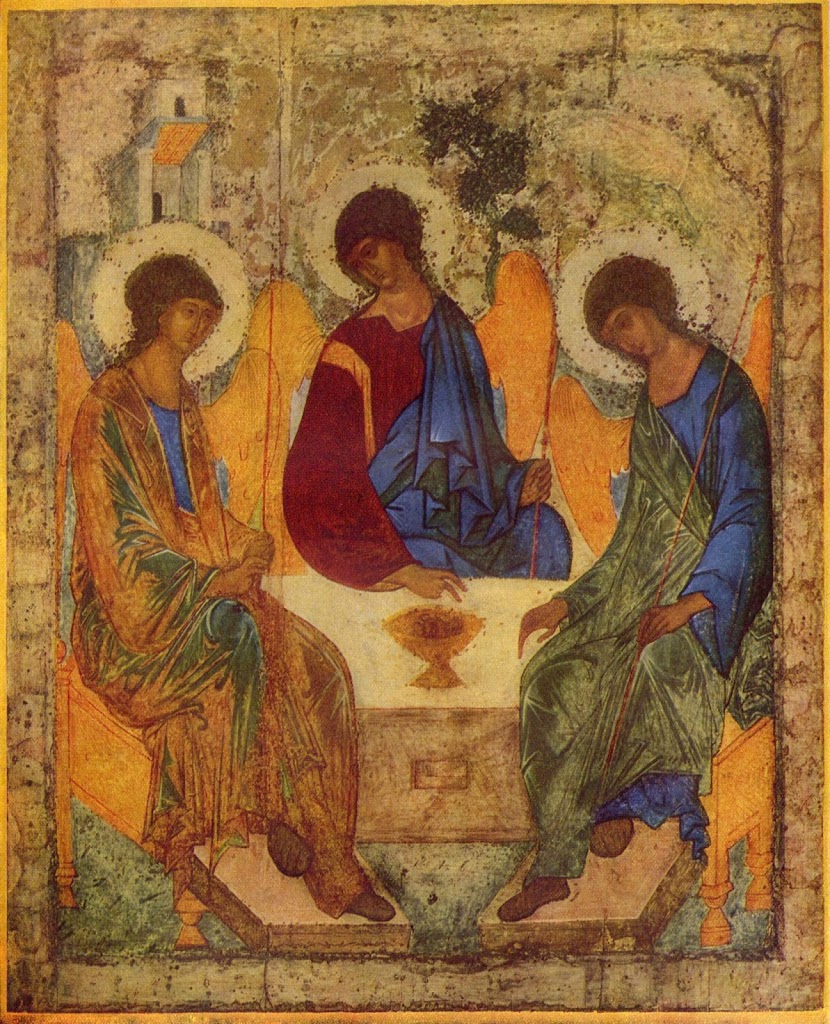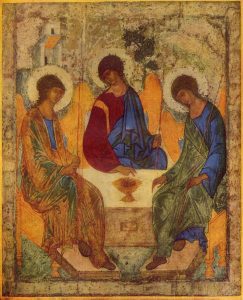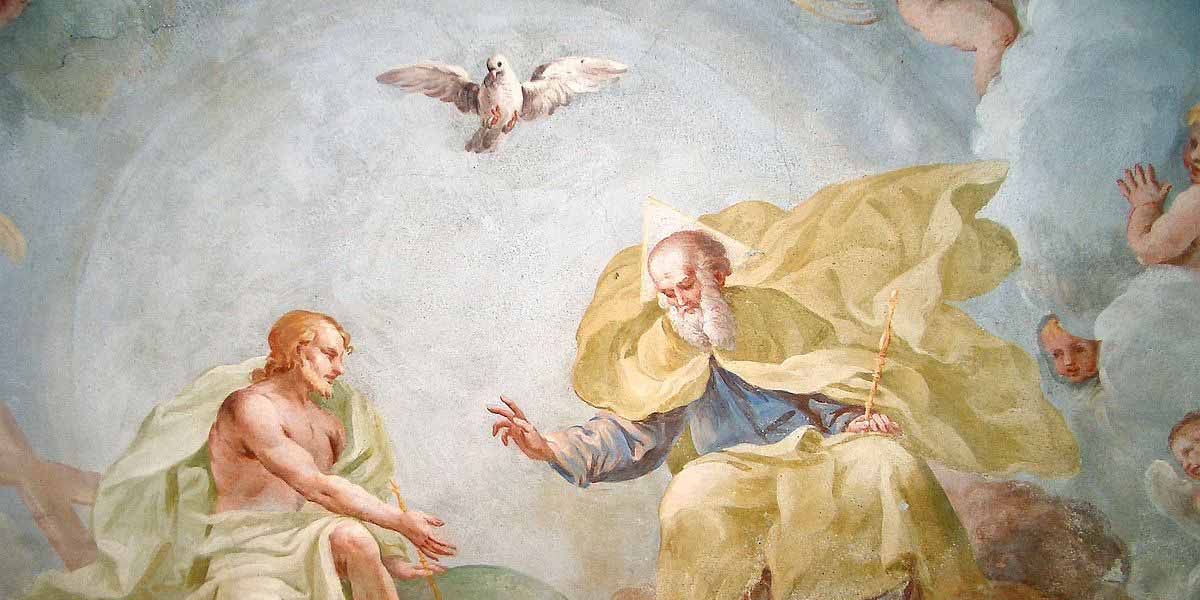The Solemnity of the Most Holy Trinity
One must be very precise when talking about the Holy Trinity, theologically speaking. The concept of one God existing as three Persons, each distinct in personhood but united in being, is so far beyond our experience that we have to rely on metaphor to help us understand. Yet we cannot press any Trinitarian metaphor too hard without falling into heresy, as
this humorous video put out by a group called “Lutheran Satire” so aptly illustrates.
My favorite way of talking about the Trinity focuses on the manner of procession of the Divine Persons. The Father knows Himself and thus begets the Son — also known as the Logos or Word — by way of intellect. The Father and the Son love one another and so the Holy Spirit (the Spirit of Love, c.f. 1 Tim 1:7) proceeds from the Father and Son by way of the will. But even then I have to be very careful not to reduce the Son and the Spirit to mere personifactions of God’s intellect and will.
The Son is God. The Spirit is God. The Father is God. Not parts of God. Not aspects or characteristics of God. But not three Gods, either. They are each fully and completely the same one God.
Indeed, the only way the three Divine Persons differ from one another is in their relationship to one another. The Son is like the Father in all things but one — He is not the Father. He is the Son. Their relationship defines them. Likewise with the Holy Spirit and His relationship with the Father and the Son. Really, when the Church describes the Son as being generated by the Father through the divine intellect, and the Spirit proceeding from them both through the divine will, it is an attempt to further describe the precise nature of the relationships within the Holy Trinity.
Relationship is such an important concept when it comes to the Holy Trinity — so much so, that whenever you hear the term “Holy Trinity” you should think in your mind, relationship. When we say God exists as a Trinity, three Persons in one God, what you should hear is God exists as relationship.
This is important, for two reasons. First, it tells us something about the nature of God. God is perfect. God lacks nothing. God has within Himself everything He could possibly want or need, and that includes relationship with others. In other words, God did not create us or the angels because He was lonely. Quite apart from creation, God has within Himself a community of love. Part of the very nature of His existence is relationship. Isn’t that a wonderful thought?
The second reason this is important is because you and I are made in the image and likeness of God. That means you and I are also meant to be in relationship. But unlike God, who exists as a community of Persons, you and I and the rest of humanity have our existence as a single person. This is why the Trinity is such a hard thing for us to imagine. We exist as one person, and that’s it. We can’t begin to fathom what it would be like to share our existence with another person. But nevertheless, we are made in the image of a God who is relationship, and we are also called to be in relationship. It is part of our nature.
We are called first and foremost to be in relationship with God, our Creator. But we are also called to be in relationship with one another. And if you think about it, this is what the Christian religion is all about. It is about helping us to have a good, loving relationship with God, and good, loving relationships with one another.
The first reading for today, from Exodus 34:4-9, talks about Moses carrying the “two stone tablets” to the top of Mount Sinai. Those are the tablets of the Ten Commandments. The first three commandments tell us how to love God. The last seven tell us how to love our neighbors. When people ask Jesus what is the greatest commandment?, Christ tells them first to love God, then to love your neighbor. The Christian life is all about living in right relationship with God and neighbor.
The two go hand in hand. It is impossible to love God without loving your neighbor. God tells us too many times in the scriptures that this is hypocrisy at its worse. The parable of the Good Samaritan is a good example, but perhaps the most direct statement comes in Matthew chapter 25 when Jesus tells us that whatever we have done (or failed to do) to the least of our brethren, we have done (or failed to do) to Him. How we love our neighbor, in other words, is counted as love for God. You cannot love God and hate your neighbor.
But nor can you love your neighbor without also loving God. Not truly. If you remove love of God from the equation, it falls all to easily into mere tolerance toward our neighbor, or kindness toward our neighbor. Tolerance and kindness are good and necessary things. But they are not the same as love.
If my neighbor engages in immoral and self-destructive behavior, I may be able to tolerate it well enough. And I can, and should, still be kind to them. After all, they are made in the image of God and that dignity deserves respect. But this is not love. Love is so much more than being kind and polite. And love cannot tolerate that which is harmful to the beloved.
We have to remind ourselves always that sin is never personal. If you think about all the different ways we can violate the commandments, most of the sins we commit are against other people. Sin is harmful to our human relationships, let alone our relationship with God. Even those sins we like to think of as secret, that affect no one but ourselves, keep us from being in right relationship with God and with one another.
So if I truly love my neighbor, I will seek out ways and opportunities to correct sinful behavior. I will discourage immorality, not because I am perfect myself, but because I love them and want to be in right relationship with them. We see St. Paul doing this for the Christians in Corinth. In both of his letters to the Corinthians, he rebukes immoral and harmful behavior he has heard about in that community, but does it as a loving father would correct a wayward son or daughter. He does it because he loves them and desires above all communion with them in Christ.
The second reading for Trinity Sunday is from the closing of Paul’s second letter to the Corinthians. It is tempting to assume the Church chose this reading because of the Trinitarian close of the letter. However, I wonder if it was not chosen because of the way it highlights how our human relationships are meant to image the loving relationships of the Holy Trinity.
Brothers and sisters, rejoice.
Mend your ways, encourage one another,
agree with one another, live in peace,
and the God of love and peace will be with you.
Greet one another with a holy kiss.
All the holy ones greet you.
The grace of the Lord Jesus Christ
and the love of God
and the fellowship of the Holy Spirit be with all of you (2 Cor 13:11-13).
There is a lesson here for how we are to lovingly correct our neighbor who has fallen into sin. First St. Paul tells them to rejoice — even though sin has wounded their relationships, there is a remedy. Jesus Christ offers mercy that is greater than any transgression we may commit. And so we should rejoice!
Next Paul tells them to mend their ways. Before we can rebuke our neighbor we must first rebuke ourselves. We must be mindful of the fact that we are all fellow sinners, and correct our neighbor always from a place of humility.
Then he tells them to encourage one another. Correcting another’s sinful behavior should always be about encouraging one another to be the holy saints we are called to be, never about condemning others as irredeemable sinners (lest we get condemned ourselves).
Finally, if we do this, we will have peace. And what is peace, but living in right relationship with those around us? Our relationships in this world should be ordered toward this peace, so that we may all enjoy together the eternal peace of Jesus Christ, the only begotten Son of God the Father, in the union of the Holy Spirit. Amen.




